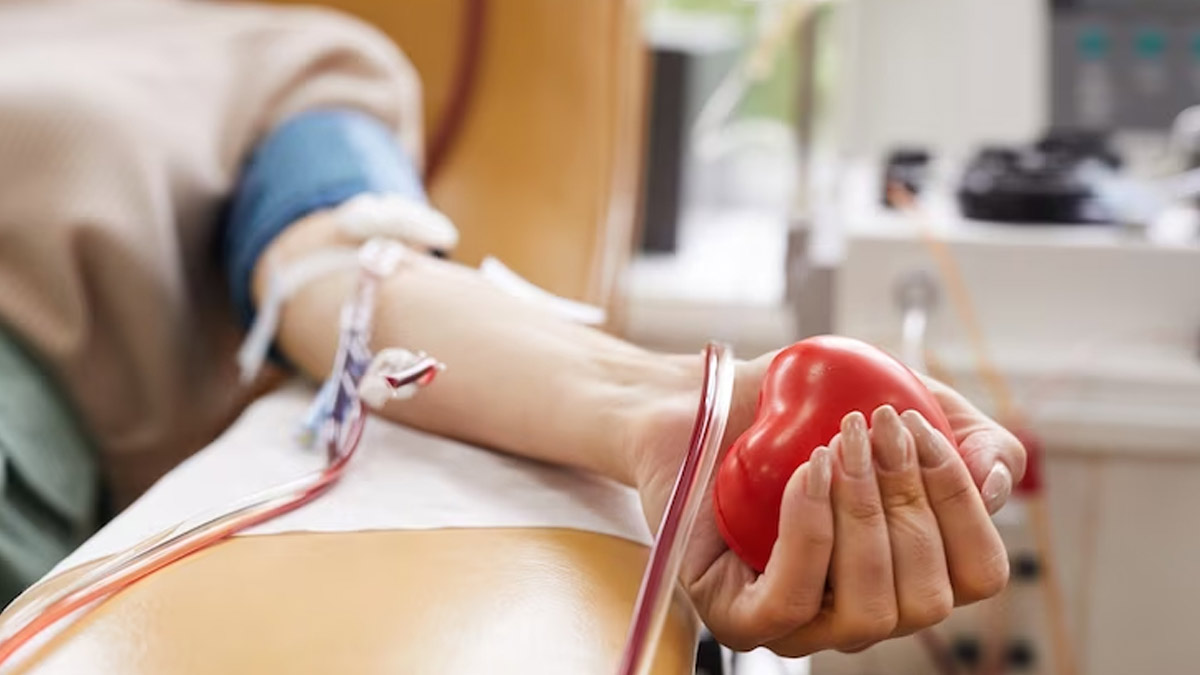
Blood donation is a noble cause, but before you do it, it is crucial to take your own health into account. There are several do’s and don’ts when it comes to donating blood and you need to pass the eligibility criteria for it. In an interaction with the OnlyMyHealth team, Dr. Veena Shenoy, Additional Professor and Head, Transfusion Medicine, Amrita Hospital, Kochi, shares some important points to remember before you go for blood donation.
Table of Content:-
Also Read: What Does A 'Silent Heart Attack' Feel Like: Warning Signs To Watch Out For
Who Can Donate Blood?

According to Dr Shenoy, you can donate blood if you:
- are in good health
- are between 18-60 years old
- weigh at least 50 kg
- maintain a haemoglobin level at or above 12.5 g/dL
- have blood pressure within normal limits
- pass the health history assessment
Note that men can donate blood once every three months, and women can donate once every four months, said Dr Shenoy. Furthermore, she emphasises on the need to eat regular meals and drink plenty of water.
“You should not donate blood if you have any acute illnesses, infections, or fever,” warns the doctor, adding, “However, individuals with controlled conditions, such as diabetes or high blood pressure, who use medications may still be eligible to donate blood.” “If the dosage of medication has been recently altered within the past month, it is advisable to wait until the blood pressure is consistently within the normal range,” she added.
Do’s And Don’ts When It Comes To Blood Donation

Here are some do’s and don’ts to consider if you’re planning to donate blood:
Do’s
- Eat a nutritious meal before donating. The donor should not be fasting, and the last meal should have been taken at least 4 hours prior to donation.
- Drink plenty of fluids before donating blood. Being well-hydrated helps ensure an easier blood draw and reduces the risk of feeling lightheaded or dizzy.
- Give correct information when answering the screening questions about your medical history, medications, and lifestyle habits. By providing this information, the safety of both the donor and the recipient is ensured.
Don'ts
- Don't donate if you are ill.
- Don't donate blood if you have cardiac disease, epilepsy, liver disease, or kidney disease.
- Don't donate blood if you are asthmatic and on steroids, diabetic and on insulin, have cancer, severe allergic disorders, bleeding disorders, etc.
- Don't consume alcohol within 24 hours of a blood donation.
- Don't donate if you engage in high-risk behaviours such as intravenous drug use or engaging in unprotected sex with multiple partners, due to the potential risks of transmitting infectious diseases.
Can A Smoker Donate Blood?
Dr Shenoy says that a smoker can donate blood. However, she advises against smoking for at least two hours before blood donation. “Smoking itself does not disqualify someone from donating blood, but if the person has respiratory conditions or other health complications related to smoking, it could potentially impact their ability to donate,” she noted.
When Can A Person Donate Blood If They Have Just Got A Piercing Or Tattoo?
“Getting a piercing or tattoo involves breaking the skin, which can introduce the risk of infection,” said Dr Shenoy, adding, “During the healing process, there is a higher chance of blood-borne infections. By implementing a one-year deferral period, blood donation organisations aim to minimise the risk of transmitting these infections through donated blood.”
Also Read: Understanding The Cause Of Dark Skin Patches In PCOS Patients: What To Do?
Measures To Take After Blood Donation

Post-blood donation, the donor is usually advised to remain on the donor bed for a few minutes longer. He or she may be asked to apply pressure to the puncture site for 5 minutes. One may have to rest for 10–15 minutes in the blood centre's refreshment room. They must eat something before leaving the blood centre.
“If you feel faint, dizzy, flushed, too warm, or suddenly weak, lie down with your feet elevated or sit down with your head between your knees until you feel better,” recommended Dr Shenoy. Here are some measures to take:
- Avoid driving for at least one hour after a blood donation
- Increase your fluid intake by one and a half litres in the next 24 hours
- Eat nutritious food and include green leafy vegetables, dates, gooseberries, and jaggery in your diet
- Avoid consuming alcoholic drinks for the next 24 hours
- Refrain from smoking for 2 hours after a blood donation
- Avoid engaging in strenuous exercise or lifting heavy weights for 24 hours
- Sometimes, the venipuncture site may appear bruised. Apply ice at frequent intervals during the first 24 hours. The discoloration will fade away within a few days
Conclusion
Blood donation helps save lives. By donating blood, people can contribute to providing essential transfusions for patients undergoing surgeries, receiving cancer treatments, managing chronic conditions, and recovering from accidents or injuries. This can ultimately make a significant impact on the healthcare system and improve patient outcomes. However, ensure that you take all the above-mentioned points into consideration.
Also watch this video
How we keep this article up to date:
We work with experts and keep a close eye on the latest in health and wellness. Whenever there is a new research or helpful information, we update our articles with accurate and useful advice.
Current Version